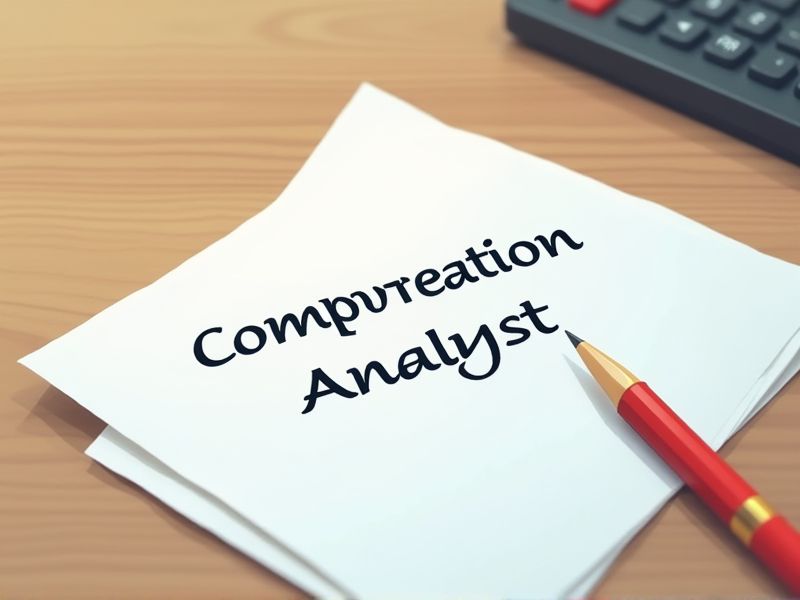
A Compensation Analyst plays a crucial role in ensuring that a company's pay structure is equitable and competitive. Certifications provide a structured understanding of compensation systems, benefit plans, and legal requirements, enhancing their analytical and strategic capabilities. They validate a professional's expertise and dedication to staying updated with industry standards and regulatory changes. Key certifications can include Certified Compensation Professional (CCP) and Global Remuneration Professional (GRP), among others.
Certified Compensation Professional (CCP)
Having a Certified Compensation Professional (CCP) designation equips a Compensation Analyst with advanced skills and knowledge in complex compensation structures. This qualification ensures the analyst understands industry best practices and can design equitable pay systems. Companies often seek CCP-certified analysts to minimize legal risks related to compensation and benefits. The certification enhances credibility and career advancement opportunities within human resources.
Professional in Human Resources (PHR)
The PHR certification equips compensation analysts with a comprehensive understanding of human resource management, enhancing their ability to design effective compensation strategies. This certification validates their expertise in aligning salary structures with organizational goals, which can improve employee retention. PHR training also ensures that analysts stay updated on employment laws, minimizing legal risks related to compensation practices. Equipped with PHR credentials, a compensation analyst gains a competitive edge, showcasing their commitment to professional excellence and ethical standards.
Senior Professional in Human Resources (SPHR)
The SPHR credential equips a compensation analyst with advanced knowledge in strategic compensation planning, essential for aligning employee pay structures with organizational goals. Possessing SPHR qualifications ensures a deep understanding of compliance standards, which mitigates the risk of legal issues from improper compensation practices. The certification prepares professionals to effectively manage complex compensation systems, aiding in employee retention and satisfaction. SPHR expertise enables the development of comprehensive strategies that integrate compensation with overall human resources objectives.
SHRM Certified Professional (SHRM-CP)
The SHRM Certified Professional (SHRM-CP) credential equips Compensation Analysts with a comprehensive understanding of HR practices, ensuring they align compensation strategies with organizational goals. Possessing an SHRM-CP can enhance a Compensation Analyst's credibility by demonstrating a commitment to staying current with industry standards. The certification provides advanced skills in data analysis and HR strategy, which are crucial for designing competitive compensation packages. It also ensures adherence to legal and ethical standards in compensation management, minimizing legal risks.
SHRM Senior Certified Professional (SHRM-SCP)
Possessing a SHRM-SCP certifies a Compensation Analyst's mastery in strategic HR competencies, enhancing credibility and trust within the organization. The certification equips professionals with the knowledge to align compensation strategies with organizational goals, essential for effective human capital management. SHRM-SCP holders are trained to navigate complex compliance issues, reducing the risk of regulatory penalties in compensation practices. The credential symbolizes a commitment to ongoing professional development, keeping analysts updated on best practices and trends in compensation management.
Certified Total Rewards Professional (CTRP)
The complexity of modern compensation structures necessitates a deep understanding of total rewards strategies, and a Certified Total Rewards Professional (CTRP) credential equips compensation analysts with this specialized knowledge. Earning a CTRP certification enhances a compensation analyst's ability to align compensation plans with organizational goals, ensuring competitiveness and legal compliance. The certification demonstrates a commitment to professional development, signaling to employers that the analyst possesses a comprehensive understanding of benefits, incentives, and market trends. Equipped with CTRP, compensation analysts can more effectively contribute to employee satisfaction and retention, impacting organizational success.
Certified Employee Benefits Specialist (CEBS)
A Certified Employee Benefits Specialist (CEBS) credential equips a Compensation Analyst with in-depth knowledge of complex benefits structures, enhancing their ability to design competitive compensation packages. Employers prioritize hiring professionals with CEBS certification as it ensures proficiency in navigating regulatory requirements and compliance issues. The expertise gained through CEBS training broadens the Compensation Analyst's skill set in strategic planning and cost management related to employee benefits. This credential strengthens credibility and trustworthiness, making Compensation Analysts more valuable assets to their organizations.
HR Analytics Certification
HR Analytics Certification equips a Compensation Analyst with the skills to interpret complex data, facilitating data-driven decision-making. Such certification enhances the ability to design equitable and competitive compensation structures by leveraging statistical analyses and market trends. Mastery in analytics allows compensation professionals to identify pay discrepancies or inefficiencies, promoting fair and transparent compensation practices. Certification also validates the analyst's proficiency, increasing credibility and career advancement opportunities within the human resources field.
Data-Driven HR Certification
A Data-Driven HR Certification equips a Compensation Analyst with the necessary skills to interpret and leverage data for effective compensation strategies. By understanding analytics, they can identify trends and make informed decisions that align with organizational goals. It enhances the ability to benchmark salaries accurately against industry standards, ensuring competitiveness. The certification fosters a strategic approach to managing compensation, leading to improved employee satisfaction and retention.
Certified Payroll Professional (CPP)
A compensation analyst often relies on certified payroll professional (CPP) credentials to accurately process and analyze complex payroll systems. The CPP certification equips analysts with the necessary skills to navigate and adhere to government regulations and tax laws, reducing the risk of compliance issues. Employers value the CPP certification as it demonstrates an analyst's expertise and commitment to maintaining high standards in payroll management. This credential can enhance career prospects and provide a competitive edge in the field of compensation analysis.
Summary
When you earn certifications as a Compensation Analyst, you enhance your credibility and professional knowledge. This boosts your ability to design effective compensation structures, aligning with industry standards. Your expertise in the field becomes more pronounced, which can lead to career advancement and higher salary prospects. Organizations likely perceive you as a valuable asset, increasingly relying on your insights for strategic decisions.
